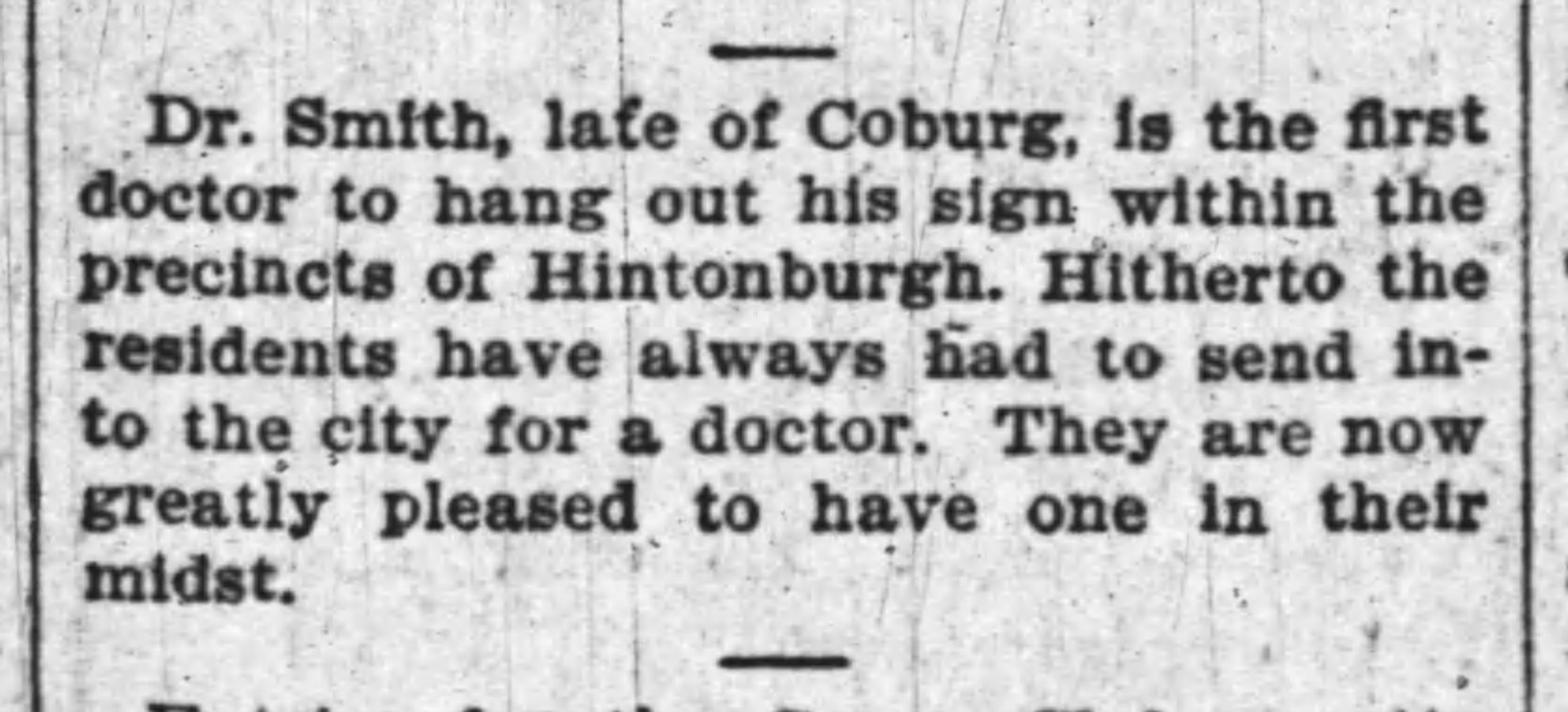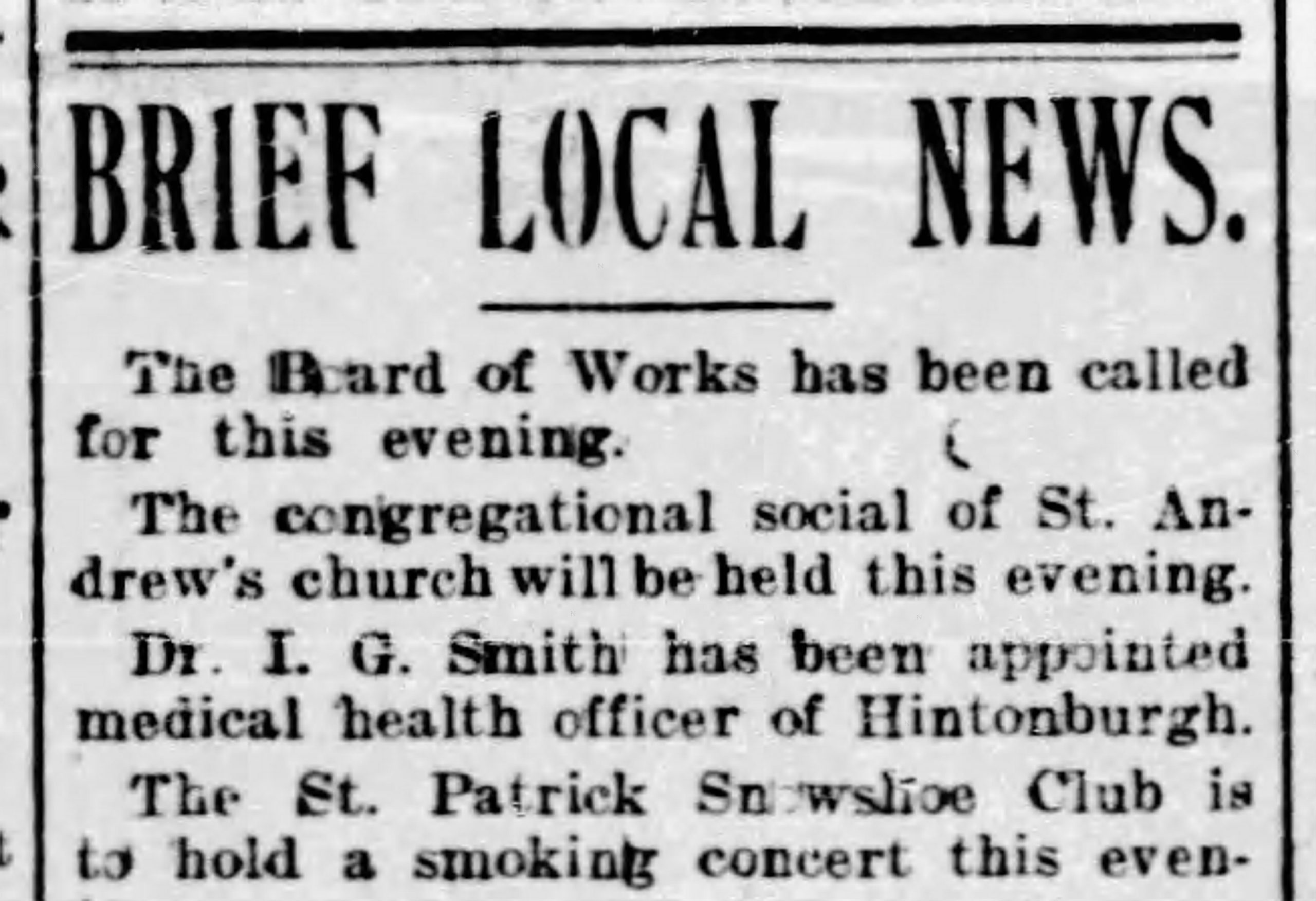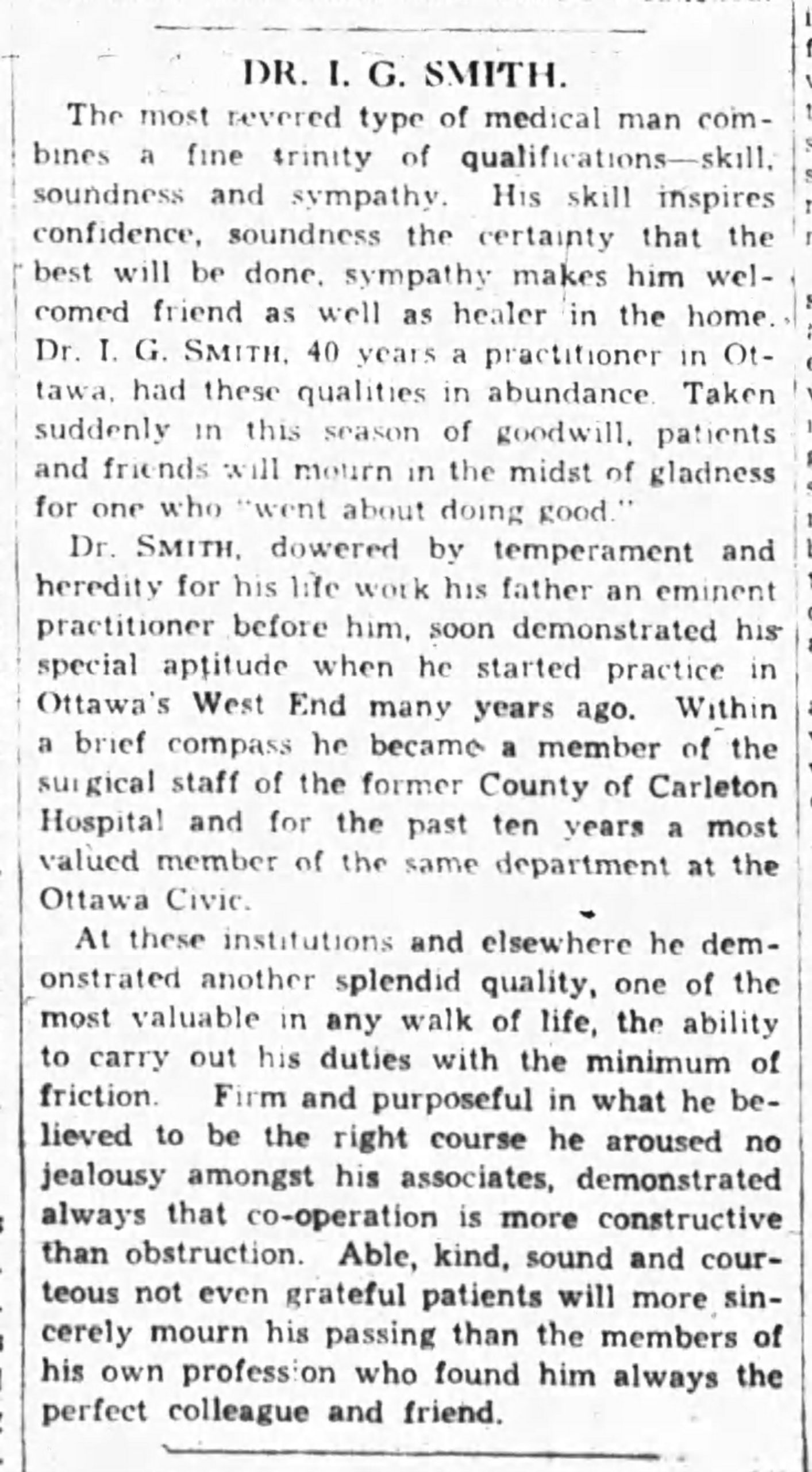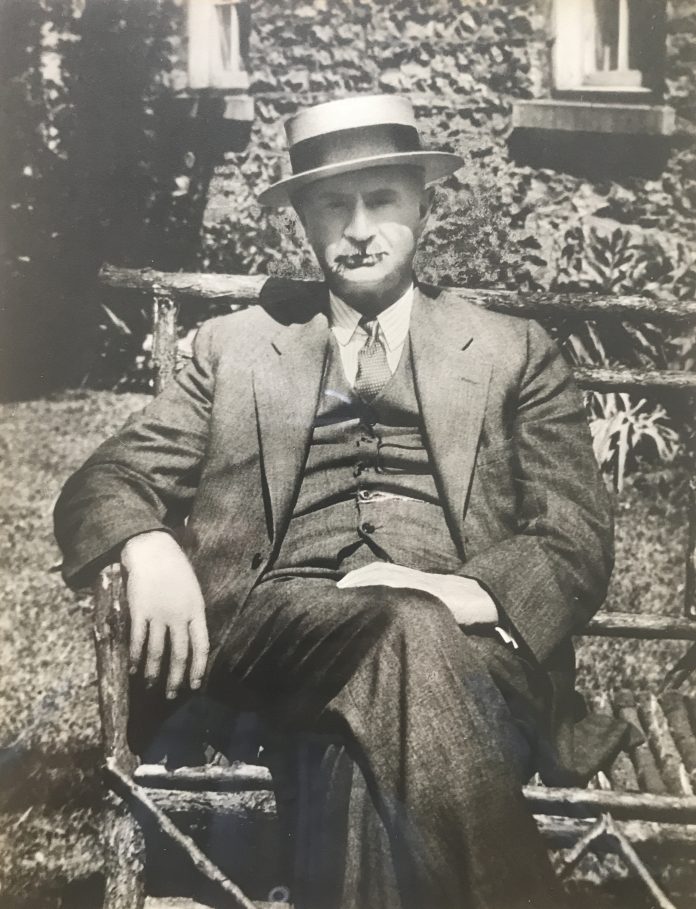By Dave Allston
Like out of an old movie or storybook, late-Victorian era Hintonburg was a thriving little village, but for years lacked something critical: a local doctor! That problem was solved with the arrival of Kitchissippi’s first doctor, Israel Goldwin Smith—a Hintonburg mainstay for the next four decades.
Now, 85 years later, his name has sadly been lost to time, but in Hintonburg’s earliest days, there was, perhaps, no resident more prominent, important and appreciated in the village than Dr. Smith.
Dr. Smith was born in Ridgetown, Ontario (located halfway between London and Windsor) in 1864. He was the son of the longtime town physician, surgeon and coroner. After a few years of working as a civil servant, he followed in his father’s footsteps by attending the University of Toronto medical school in 1891, graduating with high honours in 1896. While in school, Smith apprenticed in Cobourg and at a school for the Deaf in Belleville. But to Hintonburg’s good fortune, he would choose to open his first practice here.
Hintonburg had become an independent village in 1893, with its own village council and budget, as well as its own Medical Health Officer (MHO). The problem was that the first MHO, Dr. William Troy, was located on Elgin Street. In an era predating transportation like streetcars, it was hugely inconvenient for the village doctor to be located such a distance away.
On July 28, 1896, it was announced that Dr. Smith became “the first doctor to hang out his sign within the precincts of Hintonburgh.” According to his son’s notes years later, he had selected Hintonburg because “it was close to the capital city and he had a vague interest in politics.”

His first office (1896-1907) was in the neat stone building at 1121 Wellington St. W., formerly the Bytown and Nepean Road Company Toll House, today the ORESTA Apothecary.
His knowledge of sign language from his work at the school for the Deaf brought him many Deaf patients, and with the large francophone population in Hintonburg and Mechanicsville, Dr. Smith bought a gramophone to learn French. “The type with a big horn that used cylinders instead of records and the cylinders contained a course in French,” noted his son Herbert.
In late January 1897, Smith was officially appointed Medical Health Officer for the village of Hintonburg. His presence made a difference. Dr. Smith’s official report of April 1899 noted that, “the health of the village at present has never been surpassed. There are but few, if any[,] cases of sickness in the whole place.”
For many years, he was the west end’s only doctor. He did everything you would imagine a country doctor would do in those days for the sick or injured: making house calls, visiting hospital rooms and seeing patients in his own home.
“Before the telephone[,] anyone who wanted a doctor came to the door regardless of the hour,” wrote Herbert, adding that later, Dr. Smith had one of Hintonburg’s first phones. “We were fortunate, we had an extension upstairs. If it rang at night, someone got up and answered it.”
A call would send Dr. Smith dashing into the neighbourhood by horse or by foot. He delivered babies, performed surgeries and dealt with disease and epidemic.
The newspapers of the era were full of stories of Dr. Smith tending to west-end residents who suffered from all forms of malady: pneumonia, typhoid, falls on icy sidewalks, workplace injuries, and injuries sustained from fights and scraps, train and streetcar accidents, and eventually automobile accidents. He even participated as an expert to a murder trial in 1913.

Dr. Smith was involved with the Liberals of Hintonburgh, and later served many years as president of the Carleton Liberal Association. He narrowly lost the nomination for the Liberal party in the 1921 federal election when seen as a less desirable candidate to Carleton County voters being a “city professional man,” rather than a farmer.
He was a member of the Ottawa West Debating Society and the Royal Social Club of Hintonburg. He joined the St. Hubert’s Gun Club in Westboro and was one of their top competition shooters, while also a member of the Rivermead Golf Club and Rideau Curling Club.
In June 1907, Dr. Smith purchased “Elmsleigh,” an impressive late-1860s greystone house on Wellington Street (where Grace Manor now stands). Situated on a lot nearly an acre in size, the 12-room house (the longtime home of Richard Bishop) was partially converted for a doctor’s office and waiting room. Family came next, when Dr. Smith married Alice Pepper in 1909, and the couple had twins in 1911: Herbert Goldwin and Mary Elizabeth (“Betty”). Soon after, Alice began advertising regularly for young female help to assist with the upkeep of the home, children and office.
Dr. Smith had two horses during his years in Hintonburg, the last one “was sold when Dad got his first Ford,” joked his daughter Betty years later.
The horses were critical when Dr. Smith received calls to go out in the country during the winter.
“The usual practice was to call the livery stable. The livery men arrived with a flat bed sleigh and a team, lots of straw and blankets on the sleigh and they would proceed out through the drifts to see the patient. One call could easily take all day or all night,” recalled his son Herbert.
Dr. Smith was the victim of an exceptional crime on a winter’s night in 1910 when a serial horse thief stole his horse and cutter. A dedicated Ottawa policeman tracked down the horse and equipment across eastern Ontario over the following ten days.
“Obstetrics in those days was done in the home. The doctor was called only after the patient had been in labour for some time. His function was to tie the cord for which he received, if any money was available at all, as much as three dollars. He told me about delivering a baby one night. The father was holding a lamp at the end of the bed. It was obvious that he was about to faint. Father grabbed the lamp and threw it out the open window, grabbed the father and eased him down on the floor and delivered the baby in darkness,” remembered his son Herbert.
“Winters were bad especially to an impressionable youngster in a doctor’s house where the difficulties of the community were freely discussed. On very cold nights[,] I sometimes lay awake and wondered how many of the poor people in the Mechanicsville area were cold and how many were hungry,” the notes added. “Unemployment was high. Wages were low and father had an arrangement with the grocer on the corner, a decent man named Russell Cherry, to supply[,] occasionally[,] groceries to some of the sick families who had nothing. I believe the cost was shared.”
“Looking back on that time and in the light of present knowledge, there was so little that a doctor could do for most of his patients. There were no antibiotics, no sulfa drugs, none of the other wonder drugs, no knowledge of many of the diseases that were so prevalent and a very high mortality rate for infections,” the notes continued. “There was of course no welfare, no unemployment insurance and only the occasional church group who made an effort to help those in need of help.”
Smith was a proponent of the new branch public library for Hintonburg in 1918 and attended its formal opening. He was also involved in the formation and operation of the West End Municipal Association (what is known today as the Hintonburg Community Association) which was formed in 1919, and he often served as chairman of the recreation committee.
Professionally, Dr. Smith was president of the Ottawa Medical Society, and was chairman of the Board of Health for Ottawa from 1931-1936. In November 1924, when the new Civic Hospital opened, he was hired as a consulting surgeon, remaining in the role until his death.

At the first graduation of nursing students at the Civic in June of 1925, Smith was the first speaker, and noted that it was “an epoch-making program in the history of the medical profession and that of nursing in Ottawa.” He was a strong advocate for nurses: one of the final acts of his career was to steer city council to give preference to local nurses for key positions at Ottawa hospitals.
Dr. Smith died on Christmas morning 1936 after only a few days of strep throat. His sudden passing was mourned by the city as a whole.
Dr. John Dobbie, assistant superintendent of the Civic, said upon his death, “Dr. Smith was associated with the staff and consulting staff of the hospital since its foundation, and was always admired for his sound judgment and ability to handle any situation as it arose. He made no enemies in his lifetime of work and by his courtesy and consideration endeared himself to everyone.”
The Ottawa Journal newspaper called him a “personal friend to thousands in Ottawa” and a “physician of sterling worth,” who “went about doing good.”
The bereaved family sold Elmsleigh to the Salvation Army Grace Hospital in 1939, where it served as the staff residence until its demolition in 1965 (the city considered purchasing it in 1937 for growth space for the Parkdale Market, but the mayor nixed the acquisition during lean financial times).
Meanwhile, Dr. Smith’s medical library and instruments were left to his son Herbert, who was studying medicine at Queen’s at the time of his father’s passing (he went on to have a long career as a physician in Ottawa as well).
